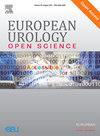实际使用过度膀胱药物对年轻人痴呆风险的影响
IF 4.5
3区 医学
Q1 UROLOGY & NEPHROLOGY
引用次数: 0
摘要
背景和目的膀胱过动症(OAB)通常使用抗胆碱能药物治疗,但人们担心其潜在的长期痴呆风险。我们的目的是研究与β -3激动剂相比,OAB抗胆碱能药物的使用是否与65岁以下新发痴呆患者有关。方法采用回顾性、倾向加权队列研究,采用加拿大人群为基础的数据。研究人群包括18-64岁的人,他们开始服用OAB抗胆碱能药物或β -3激动剂mirabegron。使用治疗加权逆倾向来平衡基线特征。主要结果是痴呆的发生率。采用经年龄和性别调整的Fine-Gray亚分布风险模型来估计风险比(hr)和95%置信区间(ci)。该研究共纳入57975例患者,其中OAB抗胆碱能组48454例(随访305724人-年),β -3激动剂组9521例(随访34605人-年)。倾向评分加权后,OAB抗胆碱能药物使用者和β -3激动剂使用者痴呆风险无显著差异(HR 0.99, 95% CI 0.86-1.15, p = 0.9)。研究的局限性是存在误分类和残留混淆的风险。结论和临床意义在65岁的人群中,OAB抗胆碱能药物与β -3激动剂的使用与痴呆无显著相关性。这有助于让医生和在年轻人中使用这些药物的患者放心。18-64岁膀胱过度活动的成年人,使用不同类型的口服药物与痴呆无关。本文章由计算机程序翻译,如有差异,请以英文原文为准。
The Impact of Real-world Use of Overactive Bladder Medications on Dementia Risk in Younger Adults
Background and objective
Overactive bladder (OAB) is often treated with anticholinergic medications, but concerns have emerged regarding their potential long-term risk of dementia. Our objective was to investigate whether the use of OAB anticholinergics, as compared with beta-3 agonists, is associated with new-onset dementia individuals under 65 yr of age.
Methods
A retrospective, propensity-weighted cohort study was conducted using population-based data from Canada. The study population included people aged 18–64 yr who started a prescription of an OAB anticholinergic medication or the beta-3 agonist mirabegron. Inverse propensity of treatment weighting was used to balance baseline characteristics. The primary outcome was the incidence of dementia. The Fine-Gray subdistribution hazard model, adjusted for age and sex, was used to estimate hazard ratios (HRs) and 95% confidence intervals (CIs).
Key findings and limitations
A total of 57 975 patients were included in the study, with 48 454 in the OAB anticholinergic group (305 724 person-years of follow-up) and 9521 in the beta-3 agonist group (34 605 person-years of follow-up). After propensity score weighting, there was no significant difference in the risk of dementia between OAB anticholinergic users and beta-3 agonist users (HR 0.99, 95% CI 0.86–1.15, p = 0.9). The study limitations are the risk of misclassification and residual confounding.
Conclusions and clinical implications
Among people <65 yr of age, the use of OAB anticholinergics versus beta-3 agonists was not significantly associated with dementia. This serves to reassure physicians and patients who use these medications in younger adults.
Patient summary
In adults aged 18–64 yr who have overactive bladder, the use of different types of oral medications are not associated with dementia.
求助全文
通过发布文献求助,成功后即可免费获取论文全文。
去求助
来源期刊

European Urology Open Science
UROLOGY & NEPHROLOGY-
CiteScore
3.40
自引率
4.00%
发文量
1183
审稿时长
49 days
 求助内容:
求助内容: 应助结果提醒方式:
应助结果提醒方式:


